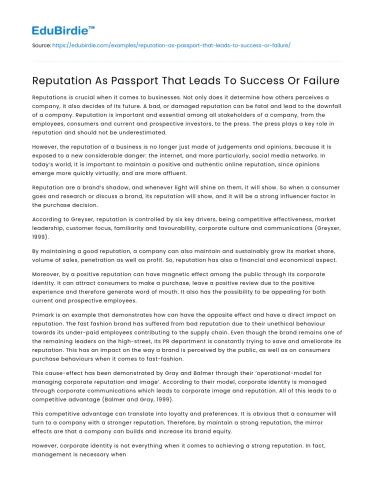Reputations is crucial when it comes to businesses. Not only does it determine how others perceives a company, it also decides of its future. A bad, or damaged reputation can be fatal and lead to the downfall of a company. Reputation is important and essential among all stakeholders of a company, from the employees, consumers and current and prospective investors, to the press. The press plays a key role in reputation and should not be underestimated.
However, the reputation of a business is no longer just made of judgements and opinions, because it is exposed to a new considerable danger: the internet, and more particularly, social media networks. In today’s world, it is important to maintain a positive and authentic online reputation, since opinions emerge more quickly virtually, and are more affluent.
Save your time!
We can take care of your essay
- Proper editing and formatting
- Free revision, title page, and bibliography
- Flexible prices and money-back guarantee
Reputation are a brand’s shadow, and whenever light will shine on them, it will show. So when a consumer goes and research or discuss a brand, its reputation will show, and it will be a strong influencer factor in the purchase decision.
According to Greyser, reputation is controlled by six key drivers, being competitive effectiveness, market leadership, customer focus, familiarity and favourability, corporate culture and communications (Greyser, 1999).
By maintaining a good reputation, a company can also maintain and sustainably grow its market share, volume of sales, penetration as well as profit. So, reputation has also a financial and economical aspect.
Moreover, by a positive reputation can have magnetic effect among the public through its corporate identity. It can attract consumers to make a purchase, leave a positive review due to the positive experience and therefore generate word of mouth. It also has the possibility to be appealing for both current and prospective employees.
Primark is an example that demonstrates how can have the opposite effect and have a direct impact on reputation. The fast fashion brand has suffered from bad reputation due to their unethical behaviour towards its under-paid employees contributing to the supply chain. Even though the brand remains one of the remaining leaders on the high-street, its PR department is constantly trying to save and ameliorate its reputation. This has an impact on the way a brand is perceived by the public, as well as on consumers purchase behaviours when it comes to fast-fashion.
This cause-effect has been demonstrated by Gray and Balmer through their ‘operational-model for managing corporate reputation and image’. According to their model, corporate identity is managed through corporate communications which leads to corporate image and reputation. All of this leads to a competitive advantage (Balmer and Gray, 1999).
This competitive advantage can translate into loyalty and preferences. It is obvious that a consumer will turn to a company with a stronger reputation. Therefore, by maintain a strong reputation, the mirror effects are that a company can builds and increase its brand equity.
However, corporate identity is not everything when it comes to achieving a strong reputation. In fact, management is necessary when it comes to corporate reputation due to its influence.
The ultimate goal that companies should aim for when it comes to reputation is to maximize their reputation capital. A brand’s reputation adequate at how it is perceived and where it resides in a consumer’s mind.
The way one can measure reputation risk is through changing behaviours. This can be examined through reviews of products or services, decrease in demand or negative share of voice. This creates a ‘reputation-reality gap’ meaning that expectations have not been met. Many companies suffer from this phenomenon and still trying to recover from it. A great example to illustrate this is Facebook. Although it remains one of the most popular social media networks among users and is still widely use, the corporate has lost trust in its consumers since the debate around privacy and cyber-bullying. Not matter how hard the corporation is trying to restore its image the reputation-reality gap continues to grow.
To conclude, a reputation follows a corporate throughout its journey, therefore it is crucial to take care of it. Therefore, managing reputation helps to improve financial performances, as well as consolidate trust in stakeholders. Online medias have made the job of reputation management manager harder, since all of the info, whether they are good or bad, true or false are visible and within the reach of all. This heavily affects how the brand is perceived as well as its trustworthiness and credibility.






 Stuck on your essay?
Stuck on your essay?

